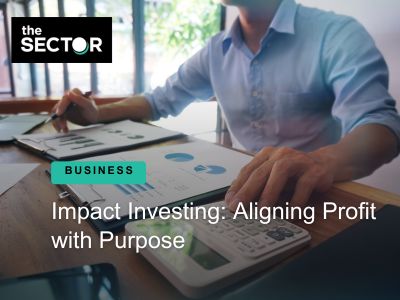Impact Investing: Aligning Profit with Purpose
Are you interested in investing your money in a way that not only generates profit but also makes a positive impact on society? If so, you may want to consider impact investing. In this blog post, we will explore the concept of impact investing and how it aligns profit with purpose.
What is Impact Investing?

Impact investing is an investment approach that aims to generate financial returns while also creating positive social or environmental benefits. The primary objective of impact investing is to brace sustainable development goals.
The Global Impact Investing Network (GIIN) plays a vital role in promoting and advancing impact investing. They provide valuable resources, conduct research, and offer guidance to investors and organizations interested in making a positive impact through their investments. By collaborating with the GIIN, investors can gain access to a network of like-minded individuals and institutions who share a common goal of creating meaningful change.

Within the realm of impact investing, there are various avenues for individuals and companies to channel their capital towards impact investments. One avenue is through impact funds. Which are investment vehicles specifically designed to finance projects and initiatives that have a social impact. These funds allow social impact investors to allocate their resources towards sectors such as education, healthcare, renewable energy, affordable housing, and more.
Social impact investors play a crucial role in driving the growth of impact investing. These investors actively seek opportunities to invest in projects and organizations that align with their values and social impact goals. By leveraging their financial resources and expertise, investors can fund innovative solutions and initiatives that address societal challenges and contribute to a more sustainable and equitable future.
Understanding the Relationship between Profit and Purpose

In impact investing, investors go beyond solely seeking financial returns.
One prominent organization in the field of impact investment is the Rockefeller Foundation. Through their impact investment program, they provide capital and help innovative ventures align their mission. They improve billions of people’s lives by providing aid to public health, food, energy, and finance. This foundation focus driving positive change and creating lasting impact.
To identify potential investments, impact investors employ rigorous evaluation practices. They assess the social and environmental impact of a project alongside its financial performance. This holistic approach ensures that the investments not only generate capital but also contribute to the betterment of society.
By bridging the gap between profit and purpose, impact investing has gained traction as a powerful tool for addressing community and environmental challenges.
Key Elements of Impact Investing

Impact investing involves several key elements that distinguish it from traditional investing. By understanding these elements, investors can effectively align profit with purpose and make a positive impact on society.
- Profit and Purpose Relationship: Impact investing recognizes the importance of achieving financial returns while also driving positive social impact. By considering the market rate returns alongside the environmental impact and social benefits of investments. Impact investors aim to create a win-win situation.
- Successful Impact Investments: Impact investing showcases numerous examples of successful investments. By investing in social impact bonds, funds, and other impact investment vehicles, investors can support projects and initiatives that address global impact areas such as education, health, sustainable agriculture, and affordable housing.
- Social Impact Bonds and Funds: Social impact bonds and funds help create a shift in the market. They provide a mechanism for investors to allocate capital towards initiatives that aim to achieve specific target outcomes. Such as reducing homelessness or improving educational attainment.
- Impact Measurement: A hallmark of impact investing is the commitment of the investor to measure and report the social and environmental performance and progress of underlying investments. Ensuring transparency and accountability while informing the practice of impact investing and building the field.
Socially Responsible Investing and the Role of Development Finance Institutions

In the world of impact investing, two key factors that contribute to creating positive change are socially responsible investing and the involvement of development finance institutions (DFIs).
Socially responsible investing (SRI) is an investment approach that focuses on generating positive financial performance while considering the health of society. Most investors make their impact investment in specific asset classes. It involves investing in companies and projects that align with ethical and social values. By incorporating impact investments decisions, SRI promotes sustainable and responsible practices in the business world. SRI allows other investors to contribute to positive change while still expecting financial returns.
Development finance institutions (DFIs) play a crucial role in impact investing. These organizations provide financial support and expertise to promote sustainable development projects in both emerging and developed economies. DFIs often invest in sectors such as renewable energy, and affordable housing, to drive change. By investing in these areas, DFIs contribute to addressing critical social challenges and supporting sustainable development.
One of the common misconceptions about impact investing is that it sacrifices profits. However, studies have shown that impact investments perform financially. By selecting investments strategically, investors aim to achieve market-rate returns while making a positive difference in society. This demonstrates that financial success and social impact are not mutually exclusive.
“Social impact investment” is a term used to describe a broader range of investments, including ventures like venture capital in high-impact startups or property investments that offer low-cost housing.
The bulk of impact investing is done by institutional investors, including hedge funds, private foundations, banks, pension funds, and other fund managers. Investment managers and venture capital firms play a vital role in the impact investment ecosystem. They identify the market and manage investment opportunities that align with impact goals. They provide capital, expertise, to sustainable businesses. Through their involvement, these entities help drive innovation and change by reinvesting profit into the community.
Impact Investing for Social Change

Impact investing has the power to drive big change by providing funding and supporting institutions with a social purpose. It enables investors to go beyond merely seeking capital and become agents of positive change. Social impact consulting is another avenue where experts provide guidance to organizations seeking to maximize their social impact.
Many investors will choose to provide capital towards local businesses. These asset classes offer opportunities for impact investors to aid and strengthen their local communities. By focusing on social investment practices, where financial return is not the sole objective, impact investors can prioritize investments that align with their values and have a positive impact on society. This approach to impact investing allows for both financial return and the advancement of impact investment goals in the market.
Social enterprises are businesses that prioritize social and environmental impact alongside financial sustainability. These companies aim to address social and environmental challenges through their operations and business models. These businesses operate across various industries, including healthcare, education, clean energy, and green agriculture. By investing in these enterprises, investors support businesses that are dedicated to creating positive change while generating capital returns.
Impact investing is a powerful new force in the fight against society’s toughest challenges, like persistent poverty, chronic ill health and environmental destruction. MaRS Centre for Impact Investing is a leading force in growing the impact investment market in Canada.
While impact investing offers opportunities to create positive impacts, it also faces challenges. Identifying suitable impact investments, measuring impact, and balancing capital with social outcomes can be complex. However, as the field continues to evolve, emerging opportunities arise, making impact investing an exciting and dynamic space to explore.
Challenges and Opportunities

Addressing challenges in social impact investments are crucial for its success. Identifying suitable investments that align with both financial and social goals can be a complex task. Additionally, impact measurement and balancing capital with social outcomes present ongoing challenges.
Some impact funds invest in causes that they believe will generate strong returns. Others consider profits to be a secondary consideration. What is an impact-investing strategy? It’s an investment strategy that targets companies or industries that prioritize the health of society and environmental outcomes.
However, as impact investing continues to gain momentum, exciting opportunities are emerging. The investment strategy allows individuals and institutions to make a tangible difference in society while still expecting market-rate returns. By investing in areas like sustainable agriculture, green energy, and affordable housing, investors can contribute to positive change in the market.
The Bottom Line
In conclusion, impact investments allows individuals and companies to focus and align their financial goals with their desire to make a positive change on the community. By investing in companies and projects that prioritize social and environmental returns. We can contribute to a more sustainable and equitable world. So, why not consider exploring impact investing opportunities and become part of the movement towards a better future?
Remember, impact investing is not just for financial experts. With the right knowledge and resources, anyone can participate in this meaningful form of investment. Start making a difference today!

